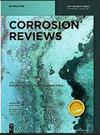咪唑啉衍生物对HCl介质中Q235钢缓蚀性能的影响:实验与理论研究
IF 3.2
4区 材料科学
Q3 ELECTROCHEMISTRY
引用次数: 0
摘要
摘要本文成功合成了两个新的咪唑啉衍生物(SMF和SMIF),并通过红外光谱、拉曼光谱和核磁共振技术对其结构进行了确证。通过实验和理论验证了该材料在盐酸溶液中的缓蚀能力和缓蚀机理。SMIF在减肥实验中的抑制率为94.69%,在Tafel实验中的抑制率为95.99%,在电化学实验中的抑制率为95.30%。其缓蚀机理是SMF和SMIF在Q235表面形成稳定的保护膜,阻碍电荷转移。EDS、FT-IR和XPS均证明SMF和SMIF抑制剂能稳定吸附在Q235表面并形成保护膜。DFT和MD也证明了其缓蚀机理。实验和理论计算表明,SMF和SMIF在1 M HCl溶液中具有优异的缓蚀性能。本文章由计算机程序翻译,如有差异,请以英文原文为准。
Effect of imidazoline derivatives on the corrosion inhibition of Q235 steel in HCl medium: experimental and theoretical investigation
Abstract In this work, two new imidazoline derivatives (SMF and SMIF) have been synthesized successfully, and their structure have been confirmed by IR, Raman, and NMR techniques. The corrosion inhibition ability and mechanism in HCl solution were proved by experimental and theoretical methods. The inhibition efficiency of SMIF was 94.69% in weight loss experiment, 95.99% (Tafel), and 95.30% (EIS) in electrochemistry. The corrosion inhibition mechanism is that SMF and SMIF form a stable protective film on the surface of Q235 and hinders charge transfer. EDS, FT-IR, and XPS all proved that SMF and SMIF inhibitors could stably adsorb on Q235 surface and form a protective film. The DFT and MD also proved the corrosion inhibiton mechanism. Experiments and theoretical calculations showed that SMF and SMIF exhibited excellent corrosion inhibition performance in 1 M HCl solution.
求助全文
通过发布文献求助,成功后即可免费获取论文全文。
去求助
来源期刊

Corrosion Reviews
工程技术-材料科学:膜
CiteScore
5.20
自引率
3.10%
发文量
44
审稿时长
4.5 months
期刊介绍:
Corrosion Reviews is an international bimonthly journal devoted to critical reviews and, to a lesser extent, outstanding original articles that are key to advancing the understanding and application of corrosion science and engineering in the service of society. Papers may be of a theoretical, experimental or practical nature, provided that they make a significant contribution to knowledge in the field.
 求助内容:
求助内容: 应助结果提醒方式:
应助结果提醒方式:


